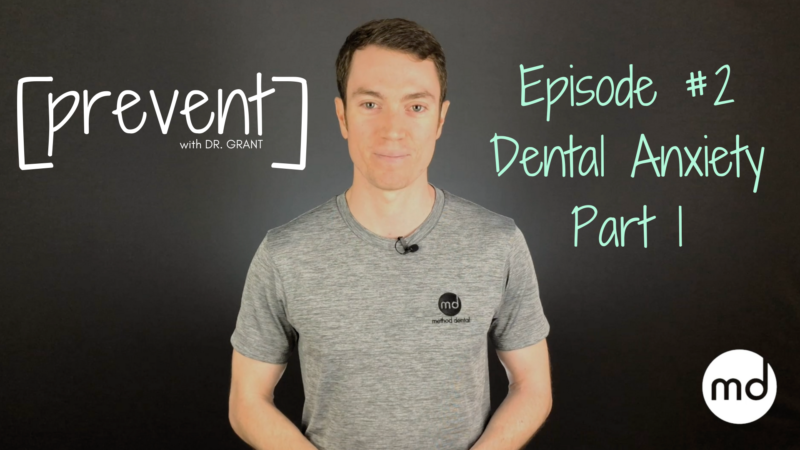
What Is Dental Anxiety and Fear?
I know that 1 in 2 people who read this blog can relate to some parts of it, if not all. That’s because up to 50% of Australian adults have some sort of anxiety about the dentist. Dental anxiety, which is anxiety associated with the thought of visiting the dentist, is the 5th most common cause of anxiety.
Dental phobia/High dental fear on the other hand is when there’s an overwhelming and irrational fear of dentistry. The person completely avoids the dentist and only seeks treatment when they’re forced to do so by extreme pain. 1 In 6 Australian adults suffer from this.
Maybe you relate to the following:
You dread making that phone call to your dentist and then you lie awake the night before the appointment because you’re afraid of the unknown. Your feelings of nervousness and anxiety get worse when you arrive at the surgery. And when your name is finally called to go in to see the dentist, your heart races so fast you can barely catch your breath. Maybe even reading this has made you feel a bit uneasy?

It’s OK
To be frank, these are all feelings you can expect to have and it’s more than OK to feel this way. I don’t personally suffer from dental anxiety specifically but I do suffer from anxiety so I know how difficult it can be to rationalise your thoughts when this wave of panic comes over you. The important thing however is to not beat yourself up for feeling this way and focus on the fact there is light at the end of the tunnel.
If you work hard towards overcoming this fear, with each visit to the dentist, your anxieties will become more manageable over time. You’ll reach a point where visiting the dentist is just another thing you do twice a year. Believe me. We treat anxious patients all the time and I’ve seen the transformation happen right before my eyes. It’s definitely not something that happens overnight but it can happen and it can happen for you too.
How Bad Can It Be?
Now you may think, “My fear of the dentist only affects me when I’m at a dentist so I’ll just stay far away from it for as long as I can and IF I really, really have to see one, I’ll just bite the bullet, feel awful for a couple of days and that will be all I need to face until the next dreaded visit”. Seems pretty harmless right? Well, I’m here to tell you there’s a flaw in this mindset and, as a matter of fact, it will make matters worse for you.
The Vicious Cycle of Dental Fear
Visiting the dentist only when you have a problem often results in more complicated, traumatic or costly treatment procedures. This can in turn further worsen and reinforce your fear of the dentist, leading to complete avoidance in the future. Coming to the dentist only when there is a problem ultimately leads to more tooth decay, more missing teeth, gum disease and worse. This vicious cycle of dental fear sets in and if not managed properly, it will not only affect your oral health, it can also affect your mental and physical health.

The Consequences
Without teeth, you simply cannot talk properly because you can no longer make the necessary sounds to pronounce words. You can’t eat the foods you love like steak or even an apple because you cannot chew and you may miss out on proper nutrition, let alone being able to enjoy your food. You don’t ever smile because you’re embarrassed to show the build-up and decay on your teeth. Personal contact with others makes you nervous because you’re afraid they’ll notice your bad breath.
What about the fact that every time you suffer from a toothache, you lose sleep, you’re in excruciating pain, your mood gets affected and your relationships suffer. You can’t work properly and you’re always living in constant fear, not knowing when the next toothache will strike. To add to that, you’ll most likely require more complicated and extensive dental treatment, which means more cost and stress.

Why Change Is the Only Way
While it’s easier said than done, change is the only way forward. Changing your mindset about dentistry means not only better oral health, but also better physical, emotional and mental health. And you can only reduce your anxiety if you want it to. If you’re committed to tackling this fear and making it a thing of your past, there are steps you can take to help you on this quest. It can be done and you don’t have to do this alone!
This is where finding the right DENTAL TEAM can help you A LOT.
TRUST
The FIRST step to overcoming your dental anxiety and fear is to find a dentist you can trust. And the best way to do this is to ask for recommendations from a friend or family member who you trust. Chances are, if their dentist is good enough for them, they might be a good fit for you too!
Find out if their dentist takes a special interest in treating anxious patients. If yes, even better! You see, trust is the foundation to any strong, healthy relationship and this cannot be truer of the relationship you have with your dentist.
Why Trust?
While it has generally been regarded that the underlying cause of dental anxiety is the result of direct negative dental experiences, it’s actually a lot more complicated than that. And here’s why TRUST is so important between you and the dentist.
You see, when you’re placed in a reclined position, you feel a sense of powerlessness. When the dentist is working on your teeth and you can’t physically see what’s happening, you feel a loss of control. Given the proximity in which the dentist works to your mouth and face, you feel an intrusion into your personal space. These inherent aspects of the dental experience will contribute to your anxieties. BUT, if you know and trust your dentist, you can be confident that your dentist has your best interests at heart and will do whatever it takes to care for you and your oral health.
What Should I Look for In A Dentist?
No two dentists are the same. Some take a special interest in treating children, some in cosmetic procedures. This is true of dentists who may or may not prefer to treat anxious patients. Just because they can, doesn’t mean they’re good at it.
Find a dentist who has a gentle and calming chairside manner. One who will listen to all your worries and concerns in a non-judgmental way. The dentist should take the time to get to know you, understand your fears and make every effort to help you feel at ease. You should be kept completely informed about what is to be done before starting and also during the procedure so you feel in control. The dentist should periodically make sure you’re not in any discomfort, give moral support, and reassure you’re doing fine during the procedure. The dentist should work hard to build your confidence and gain your trust. Find a dentist who’s friendly, warm, and can empathize with your feelings. You should always feel like you’re a priority.
What’s If Doesn’t Feel Right?
Your friend’s/family’s recommendations may not always work out in your favour. Don’t force the relationship and always trust your gut feeling. If it doesn’t feel right, it probably isn’t. And that’ OK. Don’t be discouraged. Keep looking.
Research on the internet. Check out their website, their social media. Do they have a message you resonate with? Can you identify with their brand? Call the practice and speak to the receptionist. Are they friendly? Are they helpful with answering your questions? Every single member of the practice from the receptionist, dental assistant and dentist should work towards making you feel as comfortable as possible and making your dental experience a positive one. It’s this dental team that will help you in your journey towards overcoming your dental fear.
What’s Next?
Once you think you’ve found the right dental team, make an appointment and TURN UP. This will probably be the hardest step but trust that you’re doing the right thing. You’re going to feel nervous, anxious, and your body will go into fight and flight mode. That’s OK. Allow yourself to feel those feelings but focus on the fact you’re working towards something bigger and better. If possible, bring a friend or family member along with you for moral support. Having that sense of familiarity and comfort will help give you the confidence to face your fears.
In the next blog, we will explore techniques you can use during the appointment to help you stay calm as well as techniques your dentist can use to give you a better sense of control. With the right tools, knowledge and support of your dental team, you will conquer your dental fear. It’s NOT a matter of IF, it’s a matter of WHEN. The ball is in your court.
Go to “Strategies to Manage Anxiety During a Dental Appointment: Dental Anxiety and Fear (Part 2)”
Jasmine Ooi BPharm
Co-Founder
Method Dental



